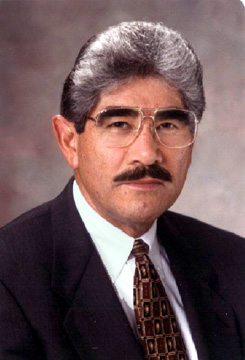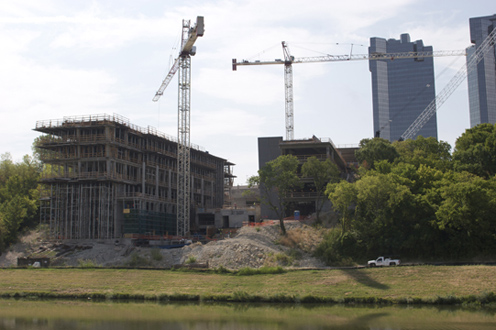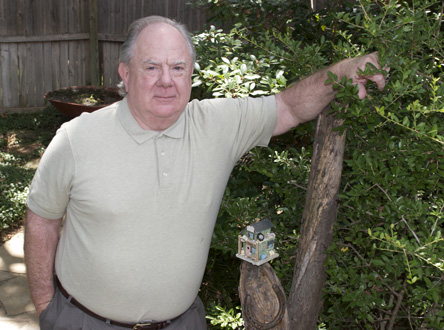Perhaps leaders of the Tarrant County College District thought that their latest grand move would quell the controversy that has been swirling deep and fast around their ambitious and hugely expensive – and, it appears, hugely botched – downtown campus plan.
 How to silence the critics? Blow off the idea of a bridge over the Trinity River and north-bank buildings with piers drilled deep into the river levees – that does away with the looming problem of getting a permit from the U.S. Army Corps of Engineers four years after the project began. Essentially abandon much of the plan for the new downtown campus. Instead, buy a ready-made campus a few blocks away – the riverside headquarters built a few years ago by RadioShack Corp., before that company’s financial health began to slide. Announce that the new campus will save money. Smiles all around.
How to silence the critics? Blow off the idea of a bridge over the Trinity River and north-bank buildings with piers drilled deep into the river levees – that does away with the looming problem of getting a permit from the U.S. Army Corps of Engineers four years after the project began. Essentially abandon much of the plan for the new downtown campus. Instead, buy a ready-made campus a few blocks away – the riverside headquarters built a few years ago by RadioShack Corp., before that company’s financial health began to slide. Announce that the new campus will save money. Smiles all around.
But for TCC Chancellor Leonardo de la Garza, the strategy isn’t working. Since the announcement of the RadioShack purchase on June 25, the alligators trailing in his wake have multiplied. Revelations that the RadioShack deal was hammered out in a series of secret negotiations by a three-member committee appointed without the knowledge even of other trustees led one former TCC adjunct professor to ask for an investigation by the district attorney’s office into possible violations of the state’s open meetings law. And the way the TCC board handled another June 25 vote – to triple the already-agreed-upon length of a new contract for de la Garza – has produced a formal complaint from a local attorney, who is threatening to file suit to challenge the legality of that new contract.
The circumstances of the vote on de la Garza’s contract – reversing the decision made by the board just a week earlier – so angered two board members that they have come forward to reveal other schisms in the TCC ranks. One trustee, board vice president Bobby McGee, who worked on the RadioShack deal, acknowledged that he has been raising questions about the downtown campus for almost a year, and tried last September, without success, to stop the downtown project until major questions could be answered. Furthermore, the two board members revealed, de la Garza has flatly refused to turn over to the board certain documents – evaluations of his senior staffers – that are public records under state law and that the board had been seeking for more than two years.
Those questions would be enough to sink the career of many a public official. But they may be just the first wave of a storm surge of problems that are roiling at the county college. The costs of TCC’s downtown development misadventures now top $580 million – for a junior college campus whose cost was estimated in 2004 at $135 million. That figure includes the RadioShack purchase as well as the cost to complete four buildings under construction at the original site. When all of the real costs of this project are totaled, that works out to a breathtaking $865 per square foot for the construction at the original site – not the $281 per square foot figure quoted by de la Garza a few weeks ago. Even the $281, however, would be well above the $199 per foot average reported last year by the state’s college oversight board, and more than five times the $56 per square foot that the University of Texas at Arlington spent to renovate the historic Santa Fe Terminal building on Jones Street into its Fort Worth campus.
Total costs for the RadioShack campus, in comparison, will be more than $400 per square foot, although that includes the land (and mineral rights) as well as construction costs, which the college board figures do not include. Only a few miles away, however, Texas Christian University, in an expansion frenzy of its own, plans to build four residence halls, three indoor sports practice facilities, and a new student union building, renovate its football stadium, and make significant additions to the School of Education building – all for about $250 million.
TCC officials now say they were moving as early as 2006 to buy the RadioShack property. Despite that, however, they continued full steam ahead on the downtown campus, shouldering aside the concerns of downtown leaders and historians – going ahead with a major cut in the bluff along which Fort Worth was founded and demolishing existing buildings before their historic value could be assessed. More than $100 million was spent on the downtown campus during that time with de la Garza even sinking half the college district’s $22 million contingency fund into the project only a few months before the RadioShack deal was announced. That kind of massive and seemingly headlong spending has raised questions – even among staunch supporters of the college – not only about the wisdom of the downtown campus, but about where all that money is coming from and what other key college needs are being ignored.
 And in fact, public records and interviews show another troubling series of moves by de la Garza regarding that getting and spending. In order to pay for the downtown project, the operations and maintenance portion of the college district’s tax rate was more than doubled in the last five years – with almost all of the new tax dollars put into an investment account to create a fund exclusively for capital improvements instead of being used for operations and maintenance system-wide. Larry Meeker, the oilman who was instrumental in founding the college district more than 40 years ago, called that move “simply a clever way to avoid a bond election that would require a vote by the citizens.” And newly elected trustee Joe Hudson said such a financing scheme gives the chancellor and the board a blank check to spend public money “with no accountability whatsoever, and that is wrong.” No other junior college district uses such a system, Hudson said. “All of the others do [capital improvements] through a bond election, which gives the people control of the amount to be spent.”
And in fact, public records and interviews show another troubling series of moves by de la Garza regarding that getting and spending. In order to pay for the downtown project, the operations and maintenance portion of the college district’s tax rate was more than doubled in the last five years – with almost all of the new tax dollars put into an investment account to create a fund exclusively for capital improvements instead of being used for operations and maintenance system-wide. Larry Meeker, the oilman who was instrumental in founding the college district more than 40 years ago, called that move “simply a clever way to avoid a bond election that would require a vote by the citizens.” And newly elected trustee Joe Hudson said such a financing scheme gives the chancellor and the board a blank check to spend public money “with no accountability whatsoever, and that is wrong.” No other junior college district uses such a system, Hudson said. “All of the others do [capital improvements] through a bond election, which gives the people control of the amount to be spent.”
College officials have also changed their tune about how they plan to use the district’s Barnett Shale income. Last year the TCC board voted to reserve all the gas well bonuses and royalties for scholarships – a promise reiterated by Vice Chancellor David Wells. Despite that vote and that promise, a few months ago, at a dinner party for donors to the scholarship fund, the fine print on invitations noted that some of the gas money would go to capital improvements. And de la Garza told the Fort Worth Business Press the day the RadioShack deal was announced that “significant Barnett Shale oil and gas bonuses and royalties” would be applied to paying for the new campus.
“I was outraged,” said one donor who attended the gala.
In the meantime, some believe that badly needed projects at the existing campuses are being neglected. Some officials, along with current and former employees – almost all of whom asked that they not be named – say maintenance is going undone, tornado sirens don’t work in some locations, and many older buildings are no longer functional. New buildings planned for years at those campuses are still unbuilt. And the projected enrollment for that new downtown campus? TCC officials said in 2004 that the downtown campus would draw about 10,000 undergraduates. That prediction was cut in half in 2005. Last year, the estimate was reduced even further, to 3,500 students.
All of the problems, plus what some faculty members called de la Garza’s autocratic style, have led to what many described as very low morale among workers at the existing campuses. Even tenured faculty members said they fear being fired if it were known they had talked to reporters.
As one faculty member said, “This is a college of higher education, dedicated to the free exchange of ideas – for everyone except those of us who work here.” At TCC’s four existing campuses, some employees and former employees say attention isn’t the only thing that the downtown drama has diverted. They allege that financing the riverside “Taj Mahal,” as Meeker has dubbed it, has meant that basic maintenance needs in some cases are not being met, leaving classes overcrowded, facilities shabby or outmoded, and some campuses without proper security.
“Most area colleges updated their security systems after the killings at Virginia Tech, but not TCC,” said one employee. And most parking lots – sprawling acres of concrete far from main campus buildings – are no longer patrolled by security guards. Other employees said budgets are so tight that most campuses are working “with skeleton crews and [the campus presidents] are not hiring new people.” Those who complain, several said, are called on the carpet and told to clam up. In a lengthy e-mail to Fort Worth Weekly, a group of “concerned faculty” – who said they feared for their jobs if they allowed their names to be used – wrote that the downtown campus drain on funds has led to a shortage of faculty at existing campuses, resulting in classes as large as 52 students, compared to the usual maximum of 25. In TCC’s distance learning program – enrollment for which is larger than any of the college’s physical campuses – funding and student services have been cut.
None of those responsible for that e-mail would give their names. But Hudson, a reform candidate elected to the board this spring, said he heard the same complaints from faculty and others when he was an adjunct professor teaching Texas government at the northeast campus before he quit to run for the board. “This whole system has to change,” he said. “No one in a public college should have to worry that they may lose their jobs for exercising their right to speak out about things that are wrong. Especially when their complaints are legitimate. “The cost of the downtown campus means that the college has been deferring for years maintenance and improvements desperately needed elsewhere,” Hudson said. He pointed out that the district’s own master plan backs up the complaints about inadequate facilities and equipment. New academic buildings, student unions and libraries are on the drawing board for these campuses, but are still unfunded, he said.
William Wright, an investment advisor and another tax watchdog and frequent user of the state’s open records act, has documents from a 2003 study by the engineering firm of Freese & Nichols showing widespread maintenance problems of long duration, including leaking roofs, water standing in basements, parking lot potholes and electrical installations “insufficiently robust” to handle the increased use of computers and other electronic gear. “Estimates at that time to fix these problems were around $100 million,” Wright said. “But before they could be fixed,” he said, “the money got sidetracked to that grand downtown campus.”
Records show that by late 2007, TCC had begun to address some of those problems: A district-wide roof repair project is under way, tornado sirens are being updated, and some paving, drainage and water line projects are done or nearly done. But other projects, such as a $29 million new wing at the southeast campus, still have not gotten started, despite being approved in 2007. TCC employees interviewed for this story called the improvements a drop in the bucket compared to the needs of the four existing campuses. “All of the campuses need new classroom space because we are bursting at the seams with students,” one said.
Trying to reach the chancellor and other administrators with their concerns, faculty members said, they have been routinely ignored.
Such sentiments are eerily similar to those expressed by faculty, some board members, and community critics at junior colleges in Santa Fe, N.M. and El Paso, both headed by de la Garza before he was hired here 11 years ago. In a Weekly story written just before the new chancellor took office here, dozens of his former colleagues accused him of ruling with an “autocratic style,” demanding “rubber stamp” loyalty from his board, and spending money recklessly.
Many employees see the downtown project as related to de la Garza’s ego. “Almost everyone I have spoken to about this new campus sees it as a self-aggrandizement by the chancellor,” said one employee. “Morale is very low.” Calls and e-mails to de la Garza and other administrators seeking comment have not been returned.
Just as a growing number of Fort Worth taxpayers were beginning to question the wisdom of pouring more than a third of a billion dollars into TCC’s plans for a downtown campus that would rise up on both sides of the Trinity River and be a “centerpiece” of the equally ambitious Trinity River Uptown development, half the project was abruptly dumped – and the price still went up.
De la Garza, who consistently told critics that the campus would go forward come hell or high water, surprised friend and foe alike when he announced on June 25 that the district had scrapped the riverfront plan and purchased the 35-acre RadioShack compound about five blocks away for its downtown campus instead. He said TCC would continue, however, with the construction of four buildings – including offices for top administrators – on the south side of the river. Two buildings are already rising out of a massive hole gouged out of the historic bluff along the Trinity.
Or maybe not. At least one board member plans to propose that the board sell the whole shebang. “I have met with some business people, and they tell me the site [on the south side of the river] is highly marketable, as is, even without completing the buildings,” Hudson said.
The explanation for the RadioShack buy was that the deal would save public dollars in the long run. But a funny thing happened on the way to those savings. A full accounting of the downtown project and RadioShack purchase shows that the expenditures will top $580 million – more than four times the original publicized cost of the campus.
Here are the numbers, compiled from TCC financial records, RadioShack filings with the Securities and Exchange Commission, and statements from Donna Darovich, the college’s public information officer:
- $41 million in land purchases for the downtown campus on both sides of the river;
- $77 million for construction work to date on two unfinished buildings on the downtown part of the site;
- $96 million in signed contracts to complete those buildings and build two more,
- $283 million in cash to KanAm Grund, the German investment company that bought the RadioShack headquarters property in 2006,
• $115,000 for studies in connection with permits needed for the now-abandoned north half of the planned campus that would have been built in the floodplain and on top of the river levee;
- $3 million in TCC brokers’ fees on the RadioShack purchase; and
- $80 million estimated to retrofit RadioShack’s four buildings so that they can be used for classrooms.
And that may not be the full tab. Taxpayers may be on the hook for other items tucked into TCC’s contract with RadioShack. Like taxes, which may cost TCC coming and going.
RadioShack’s filings with the SEC show that, as part of the deal, TCC will pick up the bill for any property taxes levied against two buildings that RadioShack will lease back from TCC, rent-free, for the next three years.
Jay Chapa, Fort Worth’s director of economic and community development explained that TCC’s tax-exempt status applies only to the portion of the property used for public education. Any property leased out for commercial use is taxed. It’s not clear what size tax bill TCC will be on the hook for over the next three years. However, since the RadioShack buildings are in a tax-increment financing district created by the city in 2002 as an incentive to keep the company’s headquarters downtown, those tax dollars will go to the electronics retailer, to help repay the company for its costs in building infrastructure, street improvements, and a public plaza in the complex.
TCC won’t just be paying taxes, however – it will also be losing its share of the tax dollars that the RadioShack property once produced, since most of it will now be off the tax rolls. Since 2004, TCC’s tax income from that property has amounted to about $658,000. Darovich and board vice president Bobby McGee said the RadioShack negotiations, which started in October, were known only to de la Garza and his small inner circle of administrators, a three-member special committee of the TCC board (including McGee), and the company’s lawyers.
Not even the Corps knew. “We were still working on the project right up ’til the day we got word of the sale,” said Corps public information officer Clay Church. And that means that another $150,000 or so in public money was also wasted. According to Kevin Craig, chief of the Corps civil branch in Fort Worth, that’s the cost of extra staff time needed for the Corps to process the requested permit for the riverside campus, because TCC had waited four years after construction began to apply for it.
McGee justified keeping the deal under wraps until the final signing because RadioShack had threatened to back out if anything leaked out beforehand. Bowing to RadioShack’s demand in order to guarantee that the run-away costs of the downtown campus could be stopped was in the best interests of the public, he said. However, board policy clearly states that trustee committees that deal with the expenditures of public money must be open to the public with posted agendas stating the purpose of the meeting and votes taken in open session.
Darovich said TCC first considered the RadioShack property in 2006. But neither in 2006, nor in October 2007 when negotiations began in earnest, did college officials put the brakes on construction at the riverfront campus. In fact, the board – most of whose members knew nothing of the deal being worked on – continued to approve additional funding for the downtown project each time the chancellor asked: $1.6 million for land purchases and $17.8 million for construction costs in 2006 and another $46.3 million for construction in 2007. And in January of this year, with the RadioShack deal just five months from fruition, the board gave de la Garza $10 million from the schools’ $22 million contingency fund to keep the downtown campus project alive.
As the newest TCC trustee, Joe Hudson isn’t sure if his board violated the state’s open meetings law when on June 25 it rescinded a vote taken only a week earlier, and gave the chancellor a three-year rather than a one-year contract. With the 10 percent raise the board had approved at the earlier meeting, the change means de la Garza will collect close to another $1 million before he steps down. But Hudson’s not sure the law is the real question. “I can’t speak to the legal issues, but it was certainly an unethical move,” he said. Hudson and McGee had both left the June 25 board meeting before the second vote occurred – and neither had been told that the chancellor’s contract would be brought up for reconsideration.
The posted agenda gave no hint that such an action was contemplated, referring only to a “routine annual evaluation of the chancellor.” Those facts have led attorney Harold Hammett, acting on behalf of an unnamed client, to give notice to the board that he believes it is in violation of the state’s open meetings act and the board’s own policy manual that requires “specificity” in its agenda postings about personnel matters that involve high-level administrators. If they don’t rescind the decision, “after clear and complete notice to the public,” and post the chancellor’s position as open, Hammett said, his client is prepared to “let the courts decide on the legality of its actions.”
Board policy requires agenda postings to be worded so that the public will understand what the board proposes to discuss. The board manual – and state law – say that “deliberations or actions pertaining to top administrators are of a particular interest, and notice of those subjects must be worded with such clarity.” “I feel sure the courts will uphold our challenge,” Hammett said. “The ‘routine annual evaluation of the chancellor’ tells the public nothing to indicate something as significant as a new contract at a large cost to the taxpayers would be discussed.” A “routine” evaluation is separate and apart from contract negotiations, he said. “We have state law and case law to support the fact that these meetings were illegal.”
On Sunday, a second challenge to the legality of TCC board actions was raised. The Fort Worth Star-Telegram reported that the RadioShack deal was negotiated by a three-member “land committee” made up of McGee, board president Louise Appleman and trustee Randall Canedy, without the knowledge of the other board members or the public. “These meetings were clearly illegal, under state law and the board’s own policy,” said Bob Mhoon, a retired U.S. Navy officer who formerly taught computer hardware and software classes for TCC’s continuing education program and also taught at UTA.
The board policy manual states that the board may create committees as needed, without being subject to open meetings law, as long as the panel acts in a purely advisory role. However, when a committee takes on the role of “supervision or control over public business or public policy [it] is subject to the Open Meetings Act when it meets to discuss that public business,” the manual says. In that case, the committee “must comply with the Act … in order to avoid depriving the public of access to the board’s actual decision-making process.”
 Mhoon has asked the Tarrant County DA’s office to investigate. “Negotiating a $283 million deal for a new campus that will be paid for by the taxpayers sure seems to be taking ‘control over public business,’ ” he said. “This downtown campus fiasco has been a classic example of incompetence, poor planning and a huge waste of taxpayer dollars, and now it seems some members have been violating the public trust in even more onerous ways, by cutting deals in secret.” De la Garza has touted the RadioShack deal as a bargain, a “cost certain” that brings to an end the escalating costs of the original downtown campus plan. He has also bragged about TCC being able to pay cash for the RadioShack property due to his “pay as you go” capital improvement plan, put into place shortly after he took the helm as chancellor in 1997.
Mhoon has asked the Tarrant County DA’s office to investigate. “Negotiating a $283 million deal for a new campus that will be paid for by the taxpayers sure seems to be taking ‘control over public business,’ ” he said. “This downtown campus fiasco has been a classic example of incompetence, poor planning and a huge waste of taxpayer dollars, and now it seems some members have been violating the public trust in even more onerous ways, by cutting deals in secret.” De la Garza has touted the RadioShack deal as a bargain, a “cost certain” that brings to an end the escalating costs of the original downtown campus plan. He has also bragged about TCC being able to pay cash for the RadioShack property due to his “pay as you go” capital improvement plan, put into place shortly after he took the helm as chancellor in 1997.
Much of that cash has come from the district’s operations and maintenance funds, built up by a couple of tax increases beginning in 2003 that more than doubled that portion of the TCC tax rate from 5 cents per $100 valuation to 13.6 cents. Hudson said most of the revenue from these tax hikes has been invested in a fund, now worth more than $462 million, to be used only for capital improvements. That allowed the district to pay cash for the downtown campus expenses, including the purchase of RadioShack, he said. But the chancellor gave a different explanation to the Business Press. He told the Press that the college is paying for the new campus partly with cash from the investment fund, and partly with “significant Barnett Shale oil and gas bonuses and royalties.”
If that is so, then the college has quietly reneged on a guarantee made by vice chancellor Wells. In an interview with the Weekly in March 2007, Wells said that the Barnett Shale signing bonuses “and all future income” will be invested and “be returned to the citizens in the form of scholarships.” The board considered the windfall “the public’s money” he said, and “they want it to go back to the people.” One thing is certain, he added, “[The money] will not be used for buildings … or to offset the cost of the downtown campus.” The board later passed a resolution that the gas money would be put into the TCC Foundation to be used only for scholarships. The foundation is a nonprofit that raises private funds to benefit the college’s students.
Retired Fort Worth physician Brian Rutledge attended a “big gala dinner party” for donors a few months ago. The dinner was held, he said, to announce that the Barnett Shale royalties and bonuses would be going to the Foundation’s scholarship fund. But he found “a slight deception,” he said. “On the back and near the bottom [of the invitation] in very small print was the statement, ‘some of these monies will go to capital improvement.'” Rutledge, a well-known doctor who practiced for 30 years here, has been a longtime supporter of the college. But for the past couple of years he has also been a staunch critic, showing up regularly at TCC board meetings and following the debacle, as he calls it, with increasing dismay. The misrepresentation regarding scholarship money was the last straw. “I was outraged,” Rutledge said, “but I doubt many people there noticed. … I’ll have to admit, these folks are very good at what they do.”
Criticisms of TCC have grown exponentially since the RadioShack deal was announced.
Rich Connor, publisher of the Business Press, wrote that the downtown project was “bungled from the start” and called for those responsible to be held accountable “for about ten seconds, and then get rid of them.” On the popular Fort Worth Architecture Forum web site, hosted by architect John Roberts, the RadioShack deal drew strong reaction, much of it from those who had initially supported the project. “The worst thing about … this boondoggle/nightmare/moneypit is what happened to the bluff,” said one post. A “natural feature of historic significance, synonymous with downtown Fort Worth … and we let a project that was error-prone from the word go cut a f’ing notch into one of the most visible pieces of it … .”
“Pure BS” is what Meeker calls de la Garza’s explanation for how the downtown fiasco is being funded. “It is a disgrace.” A downtown campus had always been the dream of the college district’s original founders. “We just didn’t envision that dream as a Taj Mahal on the Trinity,” said Meeker. “We never intended for a downtown campus to drain the other colleges of their needs, or worse, spend obscene amounts of money on a monument to the chancellor and his board that should have been spent on education. … This is a community college, where the bulk of the taxpayers’ money should go into books, scholarships and teachers, not bricks and mortar. What does this crew not understand about that?”
Rutledge, the donor turned critic, said the downtown campus project “has been shrouded in secrecy and compounded by repeated poor judgment,” summing up the dismay and anger now being expressed by many people about a project that began with great public support. “It’s almost criminal when you think about it.,” he said. “Our historic bluff has been mutilated, replaced with concrete, students have been denied money for education. … The college hierarchy has lost touch with both the folks it set out to serve 40 years ago and its main mission, to bring quality, affordable education to those in the county who can’t afford to go to college any other way.
“I can’t remember a blunder of this magnitude happening in Fort Worth at the taxpayers’ expense in my lifetime.”











